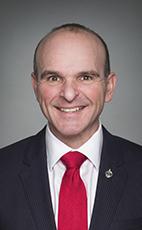Mr. Speaker, it is a pleasure to once again be here in the House for this session.
I thank the member for Drummond for his question.
We are aware of the complaints about the service offered by RCMP officers on Parliament Hill. Those complaints have been brought to our attention and we are taking them very seriously.
We have also taken note of the preliminary report of the Commissioner of Official Languages and the two recommendations he made in that regard. I would like to assure my colleagues that we will pay due attention to this matter.
Our government believes in encouraging and promoting the use of two official languages throughout Canadian society, particularly in our federal institutions, agencies, and departments. It is important to remember that official languages affect all federal institutions. The Government of Canada is committed to mobilizing all federal departments and agencies to give our official languages the importance they require.
Let me assure the member opposite from Drummond and all members of the House that respecting official languages and ensuring the safety of Canadians on Parliament Hill is a priority for our government.
We firmly believe that it is important to provide federal services in both official languages across the country. We will work with the federal departments and agencies, including the RCMP, to ensure that our institutions can communicate with Canadians in the official language of their choice.
With regard to questions and issues related to the compliance of federal services with the Official Languages Act, we are working closely with the President of the Treasury Board to ensure that all federal services are delivered in compliance with the Official Languages Act.
The Government of Canada promised to go further and promote French and English through linguistic duality-themed programs and activities.
Right now, we are also focusing on preparing, by 2020, new multi-year official languages action plans that will be in effect until 2023. We are proud to report that we have already held 20 roundtables across the country this summer. We will hold two additional roundtables and one with all the leaders in the country.
Three thousand people answered our official languages questionnaire on the Government of Canada website. That is 50% increase in participation compared to last time.
We are in the process of building a serious pan-governmental approach, a real government action plan on official languages, and the services offered to people on Parliament Hill are part of that.
We take our official languages responsibilities very seriously. We are working hard to ensure that all federal departments and agencies comply with the act.

